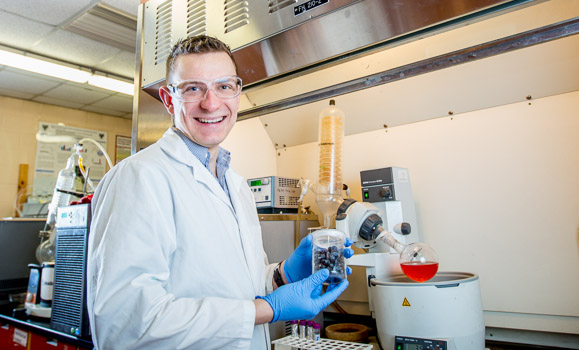Eric Pace
A little berry with big popularity
Faculty of Ag student driven by a desire to make a difference
Eric Pace is studying a little berry with big popularity on grocery store shelves.
Set to graduate this spring, Eric Pace wasnāt always sure what he wanted to do after high school but his love of animals led him to the Faculty of Agriculture.
Ericās time on the Dalhousie Agricultural Campus began as a student in the pre-veterinary science program, but after a year he realized his true calling was in animal science. A native of Truro, Eric has taken his education in animal science and applied it to his research in human health science, which, as he explains, wasnāt a big jump.
āOnce you have a vertebral column thereās not a big difference between animal science and human health science. A cowās nerve works in the same way as a humanās. Itās all the same.ā
 Eric is specifically focusing his research on the super fruit that has been gaining in popularity on grocery store shelves ā the Haskap berry. Driven by his desire to make a difference in peopleās lives and supported by an undergraduate student research award from the Natural Sciences and Engineering Research Council, Eric is exploring how to protect a key bioactive molecule in this up-and-coming iconic Canadian berry during the juice pasteurization process. Ā Itās a key molecule that unlocks significant health benefits and is one of the key reasons why people are drawn to the Haskap.
Eric is specifically focusing his research on the super fruit that has been gaining in popularity on grocery store shelves ā the Haskap berry. Driven by his desire to make a difference in peopleās lives and supported by an undergraduate student research award from the Natural Sciences and Engineering Research Council, Eric is exploring how to protect a key bioactive molecule in this up-and-coming iconic Canadian berry during the juice pasteurization process. Ā Itās a key molecule that unlocks significant health benefits and is one of the key reasons why people are drawn to the Haskap.
Eric is a key contributor to the Universityās research team.Ā Ā Working under Dr. Vasantha Rupasinghe, Canada Research Chair in Fruit Bioactives and BioProducts Eric is helping to explore all of the health benefits of Haskap.
āPeople have time for you here at Dal and youāre never just a number. They take the time to listen and to help you out ā you canāt do it by yourself. Hundreds of people have had a part in my pilipiliĀž» and Iām very grateful,ā he said.
Building on his passion for animal and human science, Eric is weighing his options after he completes his degree, which may include medical school or a Masterās degree. He confidently asserts that an education in animal science is opening up an endless amount of opportunities and that thereās no better time to pursue a career in agriculture.
āAgriculture and farming, for that matter, are scientific pursuits. If someone asked me why I came to the Faculty of Agriculture to study animal science, Iād say, āwhy not?ā This degree will prepare me to work in an industry that is continually growing and needs young, bright people to advance it scientifically. Iām advancing an industry that directly influences the food we eat. Itās incredibly rewarding to have that kind of impact.ā
Weād have to agree.
